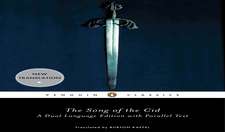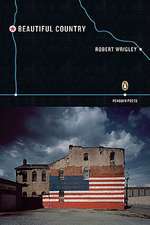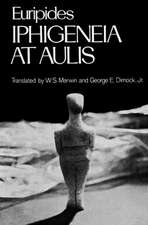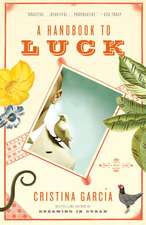Twenty Love Poems and a Song of Despair: Penguin Classics
Autor Pablo Neruda Traducere de W. S. Merwin Introducere de Cristina Garciaes Limba Spaniolă Paperback – 31 dec 2006 – vârsta de la 18 ani
The Nobel Prize-winning poet’s most popular work
When it appeared in 1924, this work launched into the international spotlight a young and unknown poet whose writings would ignite a generation. W. S. Merwin’s incomparable translation faces the original Spanish text. Now in a black-spine Classics edition with an introduction by Cristina Garcia, this book stands as an essential collection that continues to inspire lovers and poets around the world.Din seria Penguin Classics
-
 Preț: 81.00 lei
Preț: 81.00 lei -
 Preț: 103.12 lei
Preț: 103.12 lei -
 Preț: 94.66 lei
Preț: 94.66 lei -
 Preț: 100.22 lei
Preț: 100.22 lei -
 Preț: 129.73 lei
Preț: 129.73 lei -
 Preț: 103.53 lei
Preț: 103.53 lei -
 Preț: 80.44 lei
Preț: 80.44 lei -
 Preț: 76.28 lei
Preț: 76.28 lei -
 Preț: 98.97 lei
Preț: 98.97 lei -
 Preț: 67.61 lei
Preț: 67.61 lei -
 Preț: 119.60 lei
Preț: 119.60 lei -
 Preț: 95.29 lei
Preț: 95.29 lei -
 Preț: 64.54 lei
Preț: 64.54 lei -
 Preț: 74.21 lei
Preț: 74.21 lei -
 Preț: 119.20 lei
Preț: 119.20 lei -
 Preț: 101.17 lei
Preț: 101.17 lei -
 Preț: 133.62 lei
Preț: 133.62 lei -
 Preț: 77.15 lei
Preț: 77.15 lei -
 Preț: 110.75 lei
Preț: 110.75 lei -
 Preț: 87.86 lei
Preț: 87.86 lei -
 Preț: 81.03 lei
Preț: 81.03 lei -
 Preț: 78.77 lei
Preț: 78.77 lei -
 Preț: 135.25 lei
Preț: 135.25 lei -
 Preț: 92.40 lei
Preț: 92.40 lei -
 Preț: 95.29 lei
Preț: 95.29 lei -
 Preț: 88.86 lei
Preț: 88.86 lei -
 Preț: 102.21 lei
Preț: 102.21 lei -
 Preț: 110.15 lei
Preț: 110.15 lei -
 Preț: 119.53 lei
Preț: 119.53 lei -
 Preț: 93.84 lei
Preț: 93.84 lei -
 Preț: 64.54 lei
Preț: 64.54 lei -
 Preț: 89.29 lei
Preț: 89.29 lei -
 Preț: 107.67 lei
Preț: 107.67 lei -
 Preț: 75.87 lei
Preț: 75.87 lei -
 Preț: 96.30 lei
Preț: 96.30 lei -
 Preț: 90.11 lei
Preț: 90.11 lei -
 Preț: 113.78 lei
Preț: 113.78 lei -
 Preț: 100.83 lei
Preț: 100.83 lei -
 Preț: 75.15 lei
Preț: 75.15 lei -
 Preț: 132.76 lei
Preț: 132.76 lei -
 Preț: 87.86 lei
Preț: 87.86 lei -
 Preț: 93.43 lei
Preț: 93.43 lei -
 Preț: 135.89 lei
Preț: 135.89 lei -
 Preț: 95.29 lei
Preț: 95.29 lei -
 Preț: 100.01 lei
Preț: 100.01 lei -
 Preț: 105.58 lei
Preț: 105.58 lei -
 Preț: 112.74 lei
Preț: 112.74 lei -
 Preț: 96.30 lei
Preț: 96.30 lei -
 Preț: 90.73 lei
Preț: 90.73 lei -
 Preț: 88.04 lei
Preț: 88.04 lei
Preț: 69.49 lei
Nou
Puncte Express: 104
Preț estimativ în valută:
13.30€ • 13.88$ • 10.98£
13.30€ • 13.88$ • 10.98£
Carte disponibilă
Livrare economică 25 martie-08 aprilie
Livrare express 08-14 martie pentru 21.79 lei
Preluare comenzi: 021 569.72.76
Specificații
ISBN-13: 9780143039969
ISBN-10: 0143039962
Pagini: 60
Dimensiuni: 142 x 182 x 5 mm
Greutate: 0.07 kg
Editura: Penguin Books
Seria Penguin Classics
ISBN-10: 0143039962
Pagini: 60
Dimensiuni: 142 x 182 x 5 mm
Greutate: 0.07 kg
Editura: Penguin Books
Seria Penguin Classics
Notă biografică
Neftali Ricardo Reyes, whose pseudonym was to be Pablo Neruda, was born in Parral, Chile, in 1904. He grew up in the pioneer town of Temuco, briefly encountering Gabriela Mistral, who taught there for a time. In 1920 he went to Santiago to study, and the following year published his first collection of poetry, La Cancion de la Fiesta. A second collection, Crepusculario, brought him critical recognition; and in 1924 the hugely successful Veinte Poemas de Amor y una Cancion Desesperada appeared. From 1927 to 1943, Neruda lived abroad, serving as a diplomat in Rangoon, Colombo, Batavia, Singapore, Buenos Aires, Barcelona, Madrid, Paris, and Mexico City. This is the period that saw the publication of the first two volumes of his celebrated Residencia en la Tierra. He joined the Communist Party of Chile after World War II, was prosecuted as a subversive, and began an exile that took him to Russia, Eastern Europe, and China. Already the most renowned Latin American poet of his time, he returned to Chile in 1952. He died there in 1973, having just seen the fourth edition of his Obras Completas through the press. In receiving the Nobel Prize in 1971, he had said that the poet must achieve a balance "between solitude and solidarity, between feeling and action, between the intimacy of one's self, the intimacy of mankind, and the relevation of nature."
W.S. Merwin has published many highly regarded books of poems, for which he has received a number of distinguished awards—the Pulitzer Prize, Bollingen Award, Fellowship of the Academy of American Poets and the Governor's Award for Literature of the state of Hawaii among them. He has translated widely from many languages, and his versions of classics such as The Poem of the Cid and The Song of Roland are standards.
Cristina García is the author of Dreaming in Cuban, which was nominated for a National Book Award.
W.S. Merwin has published many highly regarded books of poems, for which he has received a number of distinguished awards—the Pulitzer Prize, Bollingen Award, Fellowship of the Academy of American Poets and the Governor's Award for Literature of the state of Hawaii among them. He has translated widely from many languages, and his versions of classics such as The Poem of the Cid and The Song of Roland are standards.
Cristina García is the author of Dreaming in Cuban, which was nominated for a National Book Award.
Extras
The Morning is Full
The morning is full of storm
in the heart of summer.
The clouds travel like white handkerchiefs of good-bye,
the wind, traveling, waving them in its hands.
The numberless heart of the wind
beating above our loving silence.
Orchestral and divine, resounding among the trees
like a language full of wars and songs.
Wind that bears off the dead leaves with a quick raid
and deflects the pulsing arrows of the birds.
Wind that topples her in a wave without spray
and substance without weight, and leaning fires.
Her mass of kisses breaks and sinks,
assailed in the door of the summer's wind.
Es La Mañana Llena
Es la mañana lleno de tempestad
en el corazón del verano.
Como pañuelos blancos de adiós las nubes,
el viento las sacude con sus viajeras manos.
Innumerable el corazón del viento
latiendo sobre nuestro silencio enamorado.
Zumbando entre los árboles, orquestal y divino,
como una lengua llena de guerras y de cantos.
Viento que lleva rápido robo la hojarasca
y desvia las flechas latientes de los parajos.
Viento que le derriba en ola sin espuma
y sustancia sin peso, y fuegos inclinados.
Se rompe y se submerge su volumen de besos
combatido en la puerta del viento del verano.
The morning is full of storm
in the heart of summer.
The clouds travel like white handkerchiefs of good-bye,
the wind, traveling, waving them in its hands.
The numberless heart of the wind
beating above our loving silence.
Orchestral and divine, resounding among the trees
like a language full of wars and songs.
Wind that bears off the dead leaves with a quick raid
and deflects the pulsing arrows of the birds.
Wind that topples her in a wave without spray
and substance without weight, and leaning fires.
Her mass of kisses breaks and sinks,
assailed in the door of the summer's wind.
Es La Mañana Llena
Es la mañana lleno de tempestad
en el corazón del verano.
Como pañuelos blancos de adiós las nubes,
el viento las sacude con sus viajeras manos.
Innumerable el corazón del viento
latiendo sobre nuestro silencio enamorado.
Zumbando entre los árboles, orquestal y divino,
como una lengua llena de guerras y de cantos.
Viento que lleva rápido robo la hojarasca
y desvia las flechas latientes de los parajos.
Viento que le derriba en ola sin espuma
y sustancia sin peso, y fuegos inclinados.
Se rompe y se submerge su volumen de besos
combatido en la puerta del viento del verano.
Descriere
When it appeared in 1924, this work launched into the international spotlight a young, unknown poet whose writings would ignite a generation. Merwin's incomparable translation faces the original Spanish text in this volume that continues to inspire lovers and poets.




















